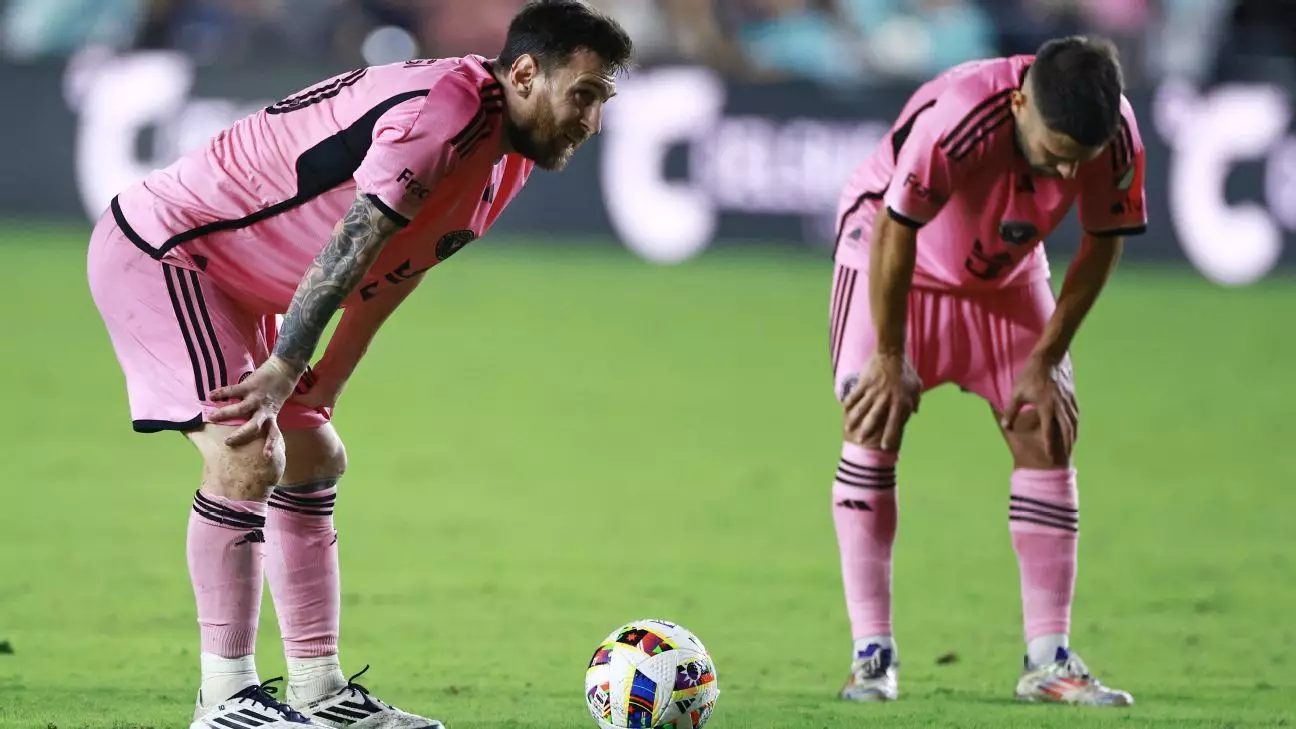In a shocking twist that could rival the most dramatic plotlines of sports narratives, MLS’s fairy-tale aspirations for a playoff party in South Florida evaporated as Inter Miami, led by superstar Lionel Messi, faced a devastating elimination at the hands of Atlanta United. This unexpected outcome has left the league’s hierarchy reeling, akin to waking from a nightmare with the cold realization that reality does not align with expectations. The dreams of an MLS Cup victory and a celebratory influx of celebrity appearances were dashed, marking a monumental shift in playoff dynamics.
The 3-2 result underscored a bitter truth: despite their star-studded lineup, Miami was unable to secure a coveted spot in the finals. As the fans and management of the Herons come to grips with this unexpected defeat, the focus shifts to Atlanta, who capitalized on their underdog status to shock the soccer world.
For Atlanta United, the journey to this monumental victory was anything but straightforward. The Five Stripes had endured a tumultuous season, including midseason transfers that saw key players Thiago Almada and Giorgos Giakoumakis depart, creating a roster bespoken of challenges. Yet, instead of folding, interim manager Rob Valentino rallied the team to play with a sense of purpose and poise, culminating in a remarkable playoff performance.
Entering the postseason, Atlanta was barely hanging on, finishing ninth in the Eastern Conference, even as they managed to eek out a playoff berth on the season’s last day. The odds seemed stacked against them, and few gave them a fighting chance against a Miami side that had dominated the regular season with a record 74 points. However, with measured grit, strategic gameplay, and crucial contributions from longtime MLS stalwarts like Brad Guzan and Dax McCarty, Atlanta executed their game plan to perfection.
The unexpected nature of this result reflects a broader trend in the design and culture of MLS playoffs. Traditionally, teams that excelled during the regular season significantly influenced playoff outcomes from previous seasons. However, this year, the narrative took a different turn. Regular season excellence is increasingly being viewed as a mere precursor to the high-stakes unpredictability of playoffs, where myths of invincibility can quickly dissolve under pressure.
As the FIFA World Cup of soccer expands globally and as the American soccer landscape continues to evolve, Atlanta’s resilience demonstrates a shifting understanding of competition. The notion of an “unbeatable” team became antiquated as different clubs learned to navigate the intricate balance between star power and teamwork.
In the aftermath of Miami’s playoff exit, manager Tata Martino’s reflections resonate deeply: the emotional toll of expectations weighed heavily on the players and staff alike. The Herons entered the postseason with immense pressure, having been idolized and expected to achieve glory. However, their vulnerable defense—having conceded 49 goals during the regular season—proved detrimental in high-stakes tilts against Atlanta.
While Miami initially took the lead with a goal from Matías Rojas, the team struggled to contain Atlanta’s aggression and tactical execution. Consecutive goals by Jamal Thiara highlighted Miami’s inability to cope with mounting pressure, a spectacle witnessed in the critical moments as they faltered under the relentless challenge from a newly inspired Atlanta side.
This defeat serves not only as a harsh lesson for Miami but as a striking reminder to the entire league about the ethos of play. Players like Jordi Alba voiced concerns about the league’s structure and competitiveness, recognizing the disparities between regular season performance and playoff reality. The experience lamented by Miami suggests a misalignment between expectations and the tangible results of the playoff structure.
As Miami looks to the future, the shadow of Lionel Messi’s contract looms large. With one year remaining, there are growing concerns regarding retention and the implications for the team’s branding and presence in the league. Will Messi pursue further endeavors, or will he bolster Miami’s strategy to reclaim its standing in the league?
In contrast, Atlanta United has reignited hopes of silverware in their quest for glory. Their grit, determination, and resilient response to challenges showcase not only their potential but underline the unpredictable thrill of soccer that keeps fans captivated throughout the season. We have witnessed the rise of the underdog, the harsh confrontation of expectations, and the perpetual evolution embedded within MLS. The stage is set for an exciting, unpredictable postseason ahead.

